PSY20001 Theories of Counselling: Reflective Journal Assignment
VerifiedAdded on 2023/01/18
|8
|1788
|62
Homework Assignment
AI Summary
This assignment is a reflective journal for the PSY20001 Theories of Counselling course. It explores various theoretical approaches, including psychoanalysis, behavioral theory, and cognitive theory. The journal delves into the core concepts of each theory, such as the unconscious mind in psychoanalysis, the role of conditioning in behavioral theory, and the impact of thoughts on behavior in cognitive theory. The student compares and contrasts these theories, highlighting their strengths and weaknesses and their application in counseling practice. Furthermore, the journal reflects on the interplay between research, process, and theory, examining how theories are tested and developed through research. The assignment also includes a discussion on the relationship between theories and hypothesis and how research contributes to the development and validation of these theories. Overall, the reflective journal provides a comprehensive analysis of the counselling theories covered in the course.
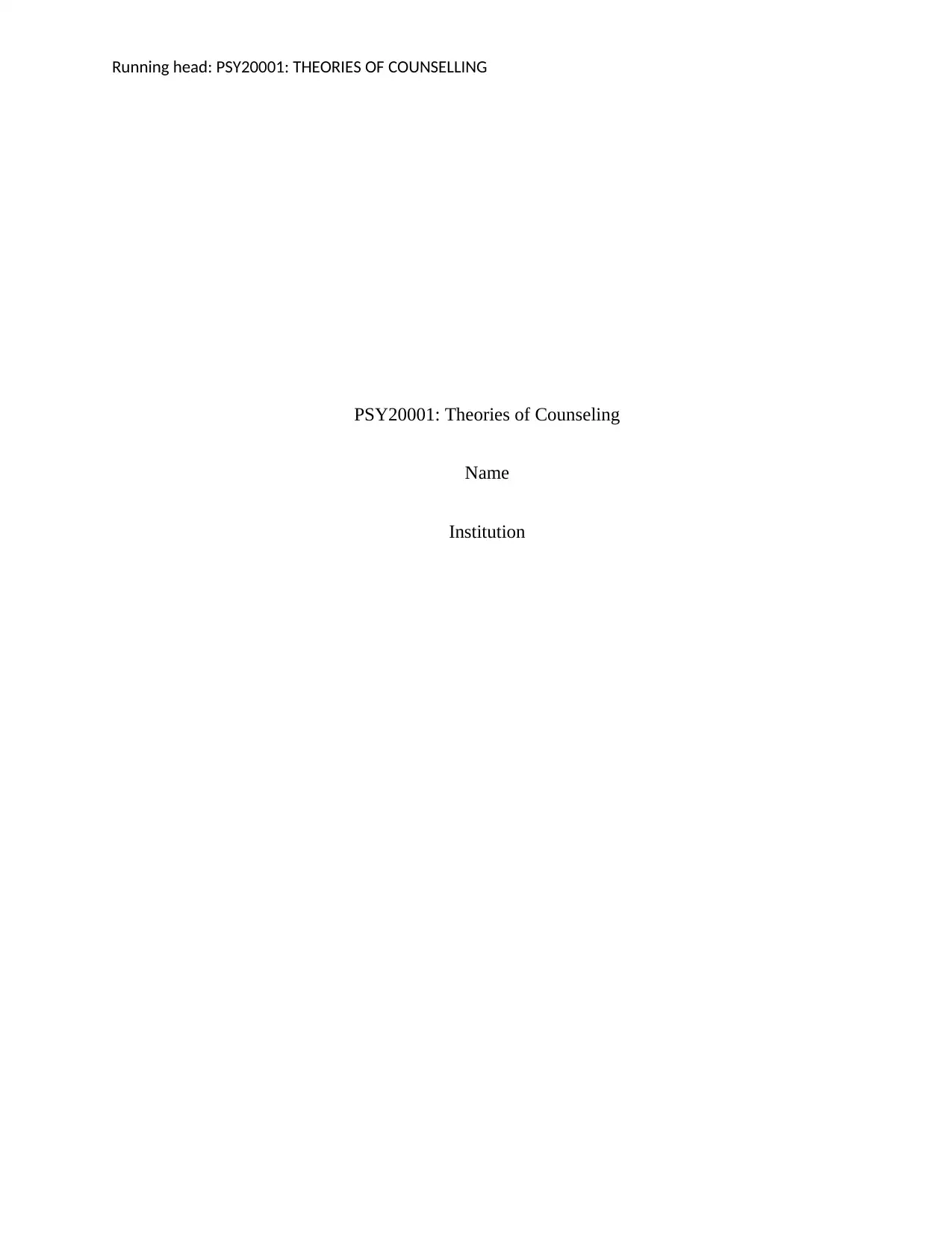
Running head: PSY20001: THEORIES OF COUNSELLING
PSY20001: Theories of Counseling
Name
Institution
PSY20001: Theories of Counseling
Name
Institution
Paraphrase This Document
Need a fresh take? Get an instant paraphrase of this document with our AI Paraphraser
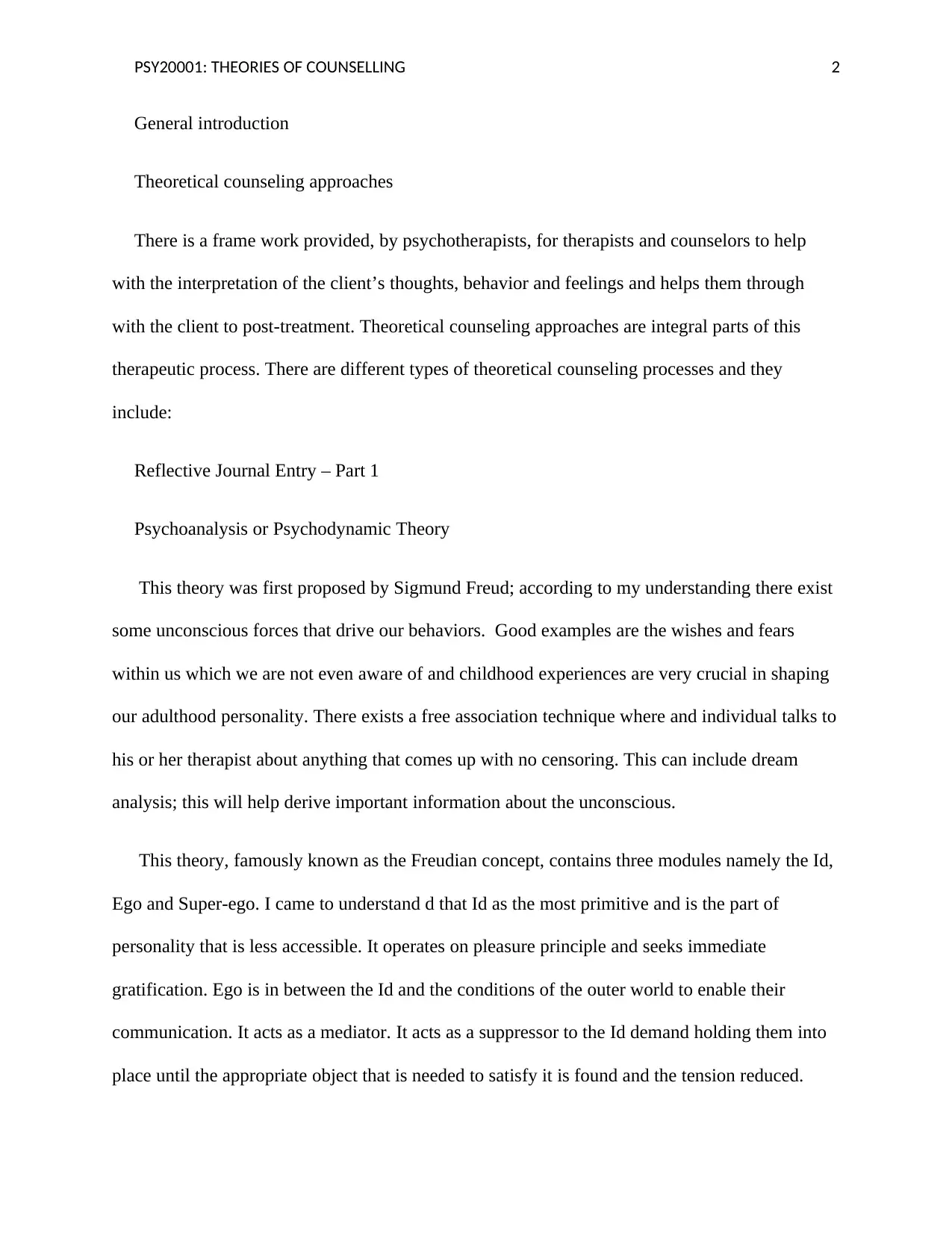
PSY20001: THEORIES OF COUNSELLING 2
General introduction
Theoretical counseling approaches
There is a frame work provided, by psychotherapists, for therapists and counselors to help
with the interpretation of the client’s thoughts, behavior and feelings and helps them through
with the client to post-treatment. Theoretical counseling approaches are integral parts of this
therapeutic process. There are different types of theoretical counseling processes and they
include:
Reflective Journal Entry – Part 1
Psychoanalysis or Psychodynamic Theory
This theory was first proposed by Sigmund Freud; according to my understanding there exist
some unconscious forces that drive our behaviors. Good examples are the wishes and fears
within us which we are not even aware of and childhood experiences are very crucial in shaping
our adulthood personality. There exists a free association technique where and individual talks to
his or her therapist about anything that comes up with no censoring. This can include dream
analysis; this will help derive important information about the unconscious.
This theory, famously known as the Freudian concept, contains three modules namely the Id,
Ego and Super-ego. I came to understand d that Id as the most primitive and is the part of
personality that is less accessible. It operates on pleasure principle and seeks immediate
gratification. Ego is in between the Id and the conditions of the outer world to enable their
communication. It acts as a mediator. It acts as a suppressor to the Id demand holding them into
place until the appropriate object that is needed to satisfy it is found and the tension reduced.
General introduction
Theoretical counseling approaches
There is a frame work provided, by psychotherapists, for therapists and counselors to help
with the interpretation of the client’s thoughts, behavior and feelings and helps them through
with the client to post-treatment. Theoretical counseling approaches are integral parts of this
therapeutic process. There are different types of theoretical counseling processes and they
include:
Reflective Journal Entry – Part 1
Psychoanalysis or Psychodynamic Theory
This theory was first proposed by Sigmund Freud; according to my understanding there exist
some unconscious forces that drive our behaviors. Good examples are the wishes and fears
within us which we are not even aware of and childhood experiences are very crucial in shaping
our adulthood personality. There exists a free association technique where and individual talks to
his or her therapist about anything that comes up with no censoring. This can include dream
analysis; this will help derive important information about the unconscious.
This theory, famously known as the Freudian concept, contains three modules namely the Id,
Ego and Super-ego. I came to understand d that Id as the most primitive and is the part of
personality that is less accessible. It operates on pleasure principle and seeks immediate
gratification. Ego is in between the Id and the conditions of the outer world to enable their
communication. It acts as a mediator. It acts as a suppressor to the Id demand holding them into
place until the appropriate object that is needed to satisfy it is found and the tension reduced.
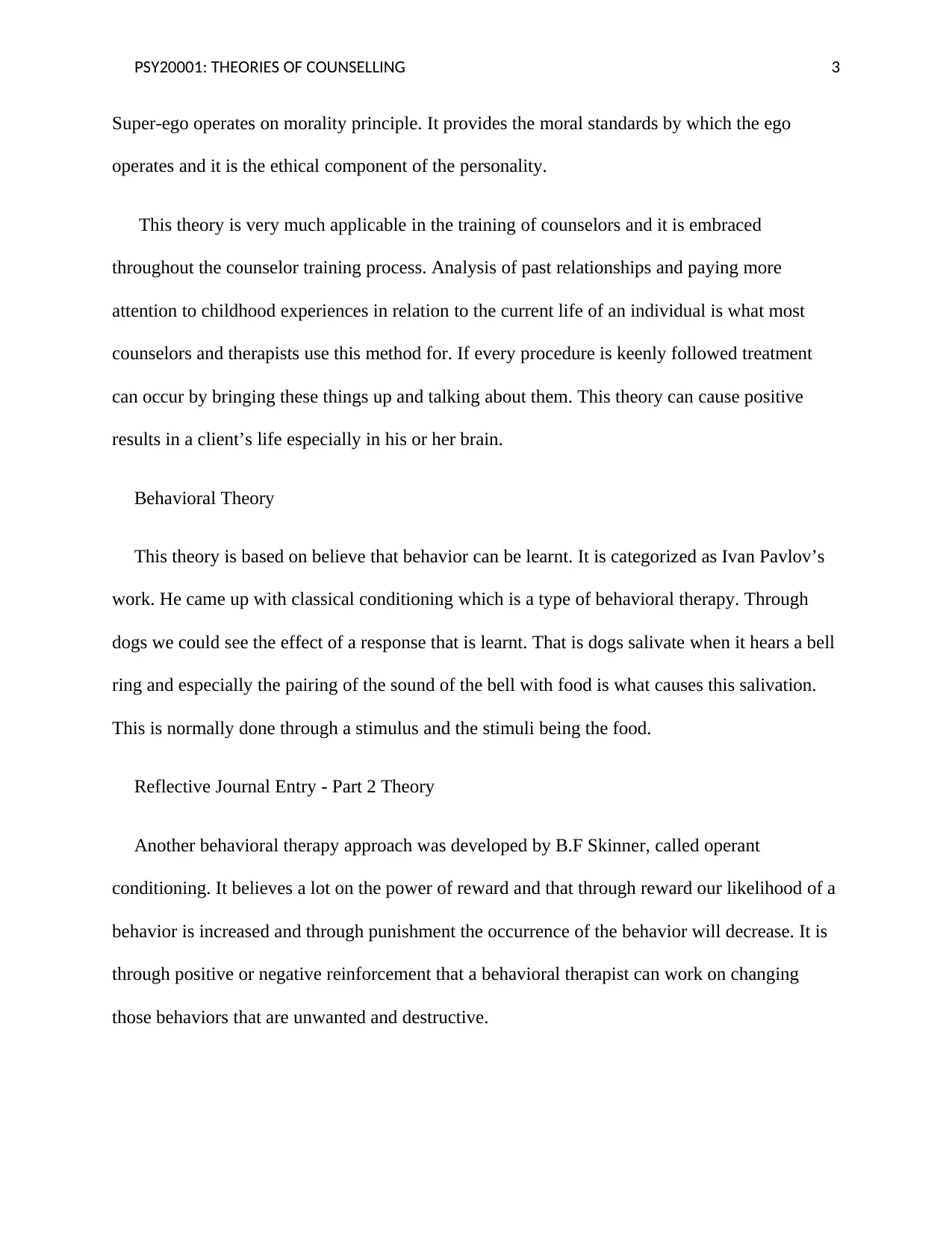
PSY20001: THEORIES OF COUNSELLING 3
Super-ego operates on morality principle. It provides the moral standards by which the ego
operates and it is the ethical component of the personality.
This theory is very much applicable in the training of counselors and it is embraced
throughout the counselor training process. Analysis of past relationships and paying more
attention to childhood experiences in relation to the current life of an individual is what most
counselors and therapists use this method for. If every procedure is keenly followed treatment
can occur by bringing these things up and talking about them. This theory can cause positive
results in a client’s life especially in his or her brain.
Behavioral Theory
This theory is based on believe that behavior can be learnt. It is categorized as Ivan Pavlov’s
work. He came up with classical conditioning which is a type of behavioral therapy. Through
dogs we could see the effect of a response that is learnt. That is dogs salivate when it hears a bell
ring and especially the pairing of the sound of the bell with food is what causes this salivation.
This is normally done through a stimulus and the stimuli being the food.
Reflective Journal Entry - Part 2 Theory
Another behavioral therapy approach was developed by B.F Skinner, called operant
conditioning. It believes a lot on the power of reward and that through reward our likelihood of a
behavior is increased and through punishment the occurrence of the behavior will decrease. It is
through positive or negative reinforcement that a behavioral therapist can work on changing
those behaviors that are unwanted and destructive.
Super-ego operates on morality principle. It provides the moral standards by which the ego
operates and it is the ethical component of the personality.
This theory is very much applicable in the training of counselors and it is embraced
throughout the counselor training process. Analysis of past relationships and paying more
attention to childhood experiences in relation to the current life of an individual is what most
counselors and therapists use this method for. If every procedure is keenly followed treatment
can occur by bringing these things up and talking about them. This theory can cause positive
results in a client’s life especially in his or her brain.
Behavioral Theory
This theory is based on believe that behavior can be learnt. It is categorized as Ivan Pavlov’s
work. He came up with classical conditioning which is a type of behavioral therapy. Through
dogs we could see the effect of a response that is learnt. That is dogs salivate when it hears a bell
ring and especially the pairing of the sound of the bell with food is what causes this salivation.
This is normally done through a stimulus and the stimuli being the food.
Reflective Journal Entry - Part 2 Theory
Another behavioral therapy approach was developed by B.F Skinner, called operant
conditioning. It believes a lot on the power of reward and that through reward our likelihood of a
behavior is increased and through punishment the occurrence of the behavior will decrease. It is
through positive or negative reinforcement that a behavioral therapist can work on changing
those behaviors that are unwanted and destructive.
⊘ This is a preview!⊘
Do you want full access?
Subscribe today to unlock all pages.

Trusted by 1+ million students worldwide
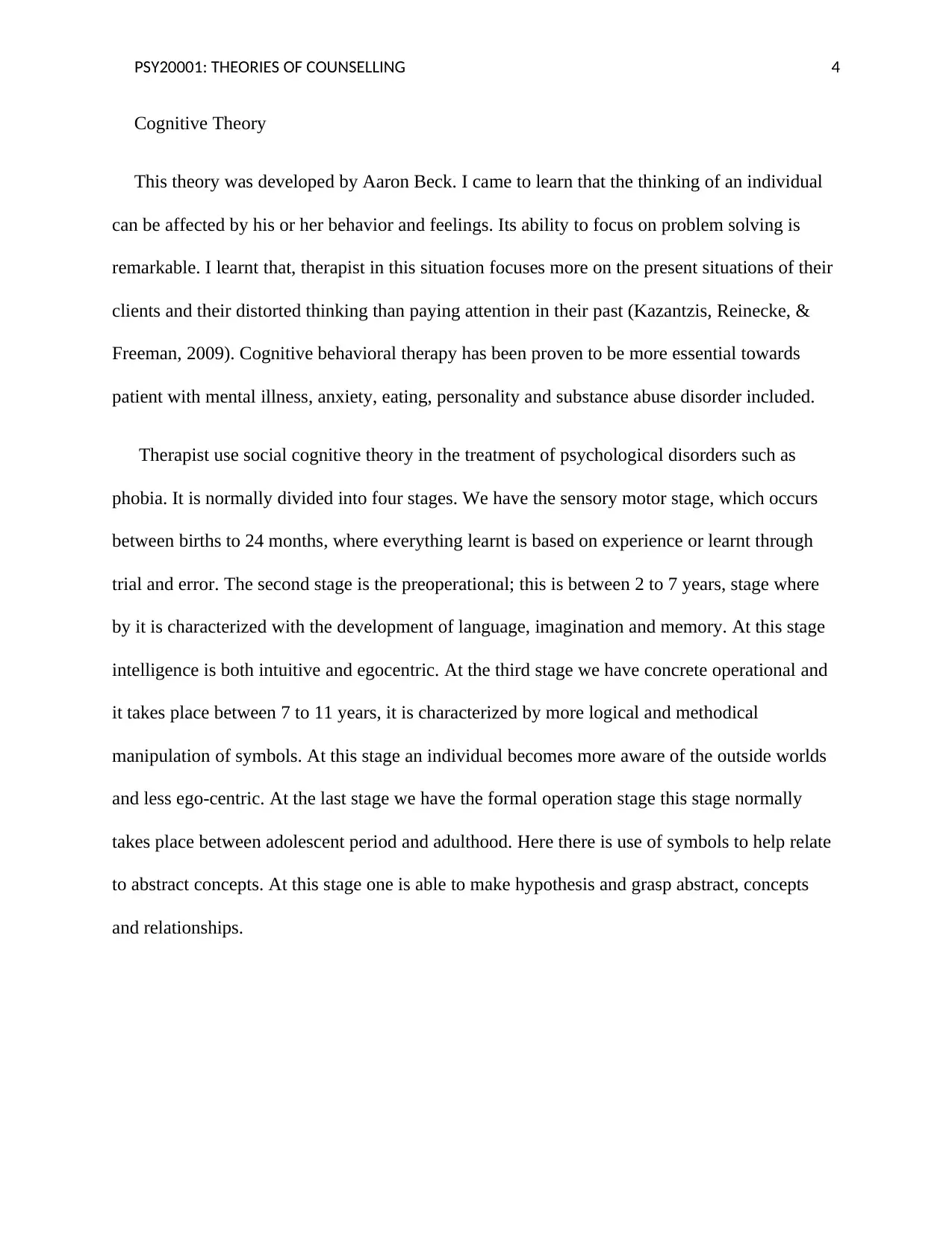
PSY20001: THEORIES OF COUNSELLING 4
Cognitive Theory
This theory was developed by Aaron Beck. I came to learn that the thinking of an individual
can be affected by his or her behavior and feelings. Its ability to focus on problem solving is
remarkable. I learnt that, therapist in this situation focuses more on the present situations of their
clients and their distorted thinking than paying attention in their past (Kazantzis, Reinecke, &
Freeman, 2009). Cognitive behavioral therapy has been proven to be more essential towards
patient with mental illness, anxiety, eating, personality and substance abuse disorder included.
Therapist use social cognitive theory in the treatment of psychological disorders such as
phobia. It is normally divided into four stages. We have the sensory motor stage, which occurs
between births to 24 months, where everything learnt is based on experience or learnt through
trial and error. The second stage is the preoperational; this is between 2 to 7 years, stage where
by it is characterized with the development of language, imagination and memory. At this stage
intelligence is both intuitive and egocentric. At the third stage we have concrete operational and
it takes place between 7 to 11 years, it is characterized by more logical and methodical
manipulation of symbols. At this stage an individual becomes more aware of the outside worlds
and less ego-centric. At the last stage we have the formal operation stage this stage normally
takes place between adolescent period and adulthood. Here there is use of symbols to help relate
to abstract concepts. At this stage one is able to make hypothesis and grasp abstract, concepts
and relationships.
Cognitive Theory
This theory was developed by Aaron Beck. I came to learn that the thinking of an individual
can be affected by his or her behavior and feelings. Its ability to focus on problem solving is
remarkable. I learnt that, therapist in this situation focuses more on the present situations of their
clients and their distorted thinking than paying attention in their past (Kazantzis, Reinecke, &
Freeman, 2009). Cognitive behavioral therapy has been proven to be more essential towards
patient with mental illness, anxiety, eating, personality and substance abuse disorder included.
Therapist use social cognitive theory in the treatment of psychological disorders such as
phobia. It is normally divided into four stages. We have the sensory motor stage, which occurs
between births to 24 months, where everything learnt is based on experience or learnt through
trial and error. The second stage is the preoperational; this is between 2 to 7 years, stage where
by it is characterized with the development of language, imagination and memory. At this stage
intelligence is both intuitive and egocentric. At the third stage we have concrete operational and
it takes place between 7 to 11 years, it is characterized by more logical and methodical
manipulation of symbols. At this stage an individual becomes more aware of the outside worlds
and less ego-centric. At the last stage we have the formal operation stage this stage normally
takes place between adolescent period and adulthood. Here there is use of symbols to help relate
to abstract concepts. At this stage one is able to make hypothesis and grasp abstract, concepts
and relationships.
Paraphrase This Document
Need a fresh take? Get an instant paraphrase of this document with our AI Paraphraser
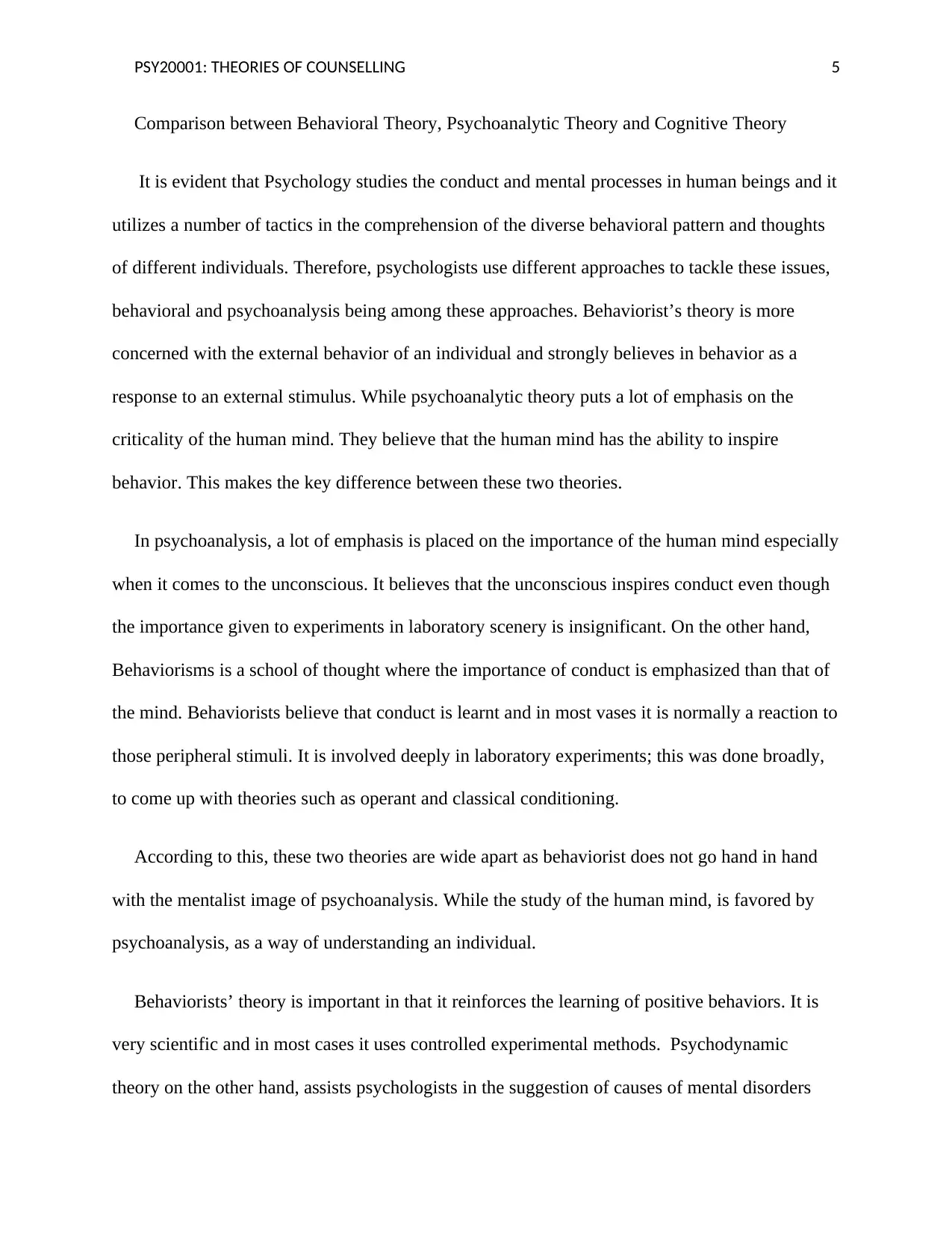
PSY20001: THEORIES OF COUNSELLING 5
Comparison between Behavioral Theory, Psychoanalytic Theory and Cognitive Theory
It is evident that Psychology studies the conduct and mental processes in human beings and it
utilizes a number of tactics in the comprehension of the diverse behavioral pattern and thoughts
of different individuals. Therefore, psychologists use different approaches to tackle these issues,
behavioral and psychoanalysis being among these approaches. Behaviorist’s theory is more
concerned with the external behavior of an individual and strongly believes in behavior as a
response to an external stimulus. While psychoanalytic theory puts a lot of emphasis on the
criticality of the human mind. They believe that the human mind has the ability to inspire
behavior. This makes the key difference between these two theories.
In psychoanalysis, a lot of emphasis is placed on the importance of the human mind especially
when it comes to the unconscious. It believes that the unconscious inspires conduct even though
the importance given to experiments in laboratory scenery is insignificant. On the other hand,
Behaviorisms is a school of thought where the importance of conduct is emphasized than that of
the mind. Behaviorists believe that conduct is learnt and in most vases it is normally a reaction to
those peripheral stimuli. It is involved deeply in laboratory experiments; this was done broadly,
to come up with theories such as operant and classical conditioning.
According to this, these two theories are wide apart as behaviorist does not go hand in hand
with the mentalist image of psychoanalysis. While the study of the human mind, is favored by
psychoanalysis, as a way of understanding an individual.
Behaviorists’ theory is important in that it reinforces the learning of positive behaviors. It is
very scientific and in most cases it uses controlled experimental methods. Psychodynamic
theory on the other hand, assists psychologists in the suggestion of causes of mental disorders
Comparison between Behavioral Theory, Psychoanalytic Theory and Cognitive Theory
It is evident that Psychology studies the conduct and mental processes in human beings and it
utilizes a number of tactics in the comprehension of the diverse behavioral pattern and thoughts
of different individuals. Therefore, psychologists use different approaches to tackle these issues,
behavioral and psychoanalysis being among these approaches. Behaviorist’s theory is more
concerned with the external behavior of an individual and strongly believes in behavior as a
response to an external stimulus. While psychoanalytic theory puts a lot of emphasis on the
criticality of the human mind. They believe that the human mind has the ability to inspire
behavior. This makes the key difference between these two theories.
In psychoanalysis, a lot of emphasis is placed on the importance of the human mind especially
when it comes to the unconscious. It believes that the unconscious inspires conduct even though
the importance given to experiments in laboratory scenery is insignificant. On the other hand,
Behaviorisms is a school of thought where the importance of conduct is emphasized than that of
the mind. Behaviorists believe that conduct is learnt and in most vases it is normally a reaction to
those peripheral stimuli. It is involved deeply in laboratory experiments; this was done broadly,
to come up with theories such as operant and classical conditioning.
According to this, these two theories are wide apart as behaviorist does not go hand in hand
with the mentalist image of psychoanalysis. While the study of the human mind, is favored by
psychoanalysis, as a way of understanding an individual.
Behaviorists’ theory is important in that it reinforces the learning of positive behaviors. It is
very scientific and in most cases it uses controlled experimental methods. Psychodynamic
theory on the other hand, assists psychologists in the suggestion of causes of mental disorders
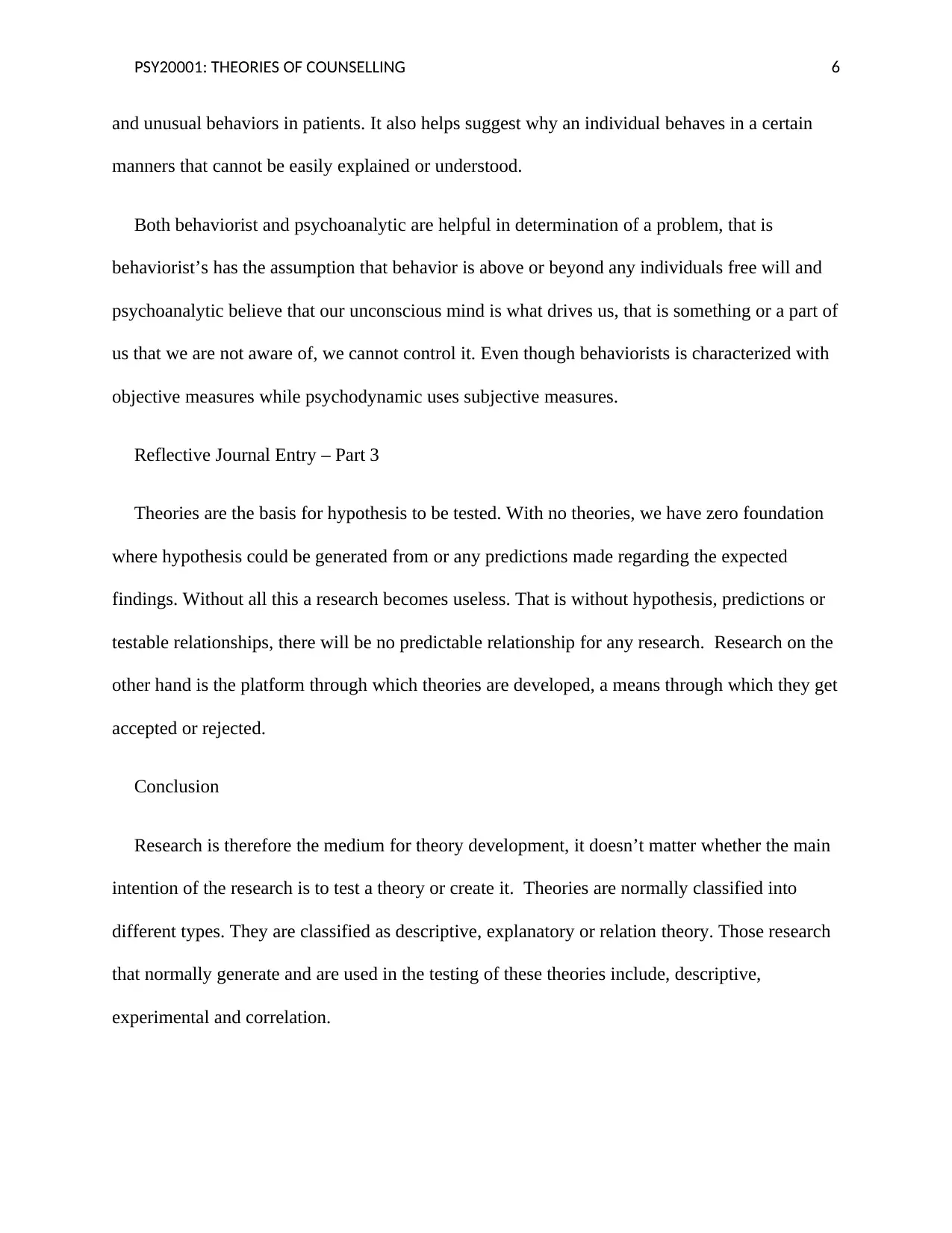
PSY20001: THEORIES OF COUNSELLING 6
and unusual behaviors in patients. It also helps suggest why an individual behaves in a certain
manners that cannot be easily explained or understood.
Both behaviorist and psychoanalytic are helpful in determination of a problem, that is
behaviorist’s has the assumption that behavior is above or beyond any individuals free will and
psychoanalytic believe that our unconscious mind is what drives us, that is something or a part of
us that we are not aware of, we cannot control it. Even though behaviorists is characterized with
objective measures while psychodynamic uses subjective measures.
Reflective Journal Entry – Part 3
Theories are the basis for hypothesis to be tested. With no theories, we have zero foundation
where hypothesis could be generated from or any predictions made regarding the expected
findings. Without all this a research becomes useless. That is without hypothesis, predictions or
testable relationships, there will be no predictable relationship for any research. Research on the
other hand is the platform through which theories are developed, a means through which they get
accepted or rejected.
Conclusion
Research is therefore the medium for theory development, it doesn’t matter whether the main
intention of the research is to test a theory or create it. Theories are normally classified into
different types. They are classified as descriptive, explanatory or relation theory. Those research
that normally generate and are used in the testing of these theories include, descriptive,
experimental and correlation.
and unusual behaviors in patients. It also helps suggest why an individual behaves in a certain
manners that cannot be easily explained or understood.
Both behaviorist and psychoanalytic are helpful in determination of a problem, that is
behaviorist’s has the assumption that behavior is above or beyond any individuals free will and
psychoanalytic believe that our unconscious mind is what drives us, that is something or a part of
us that we are not aware of, we cannot control it. Even though behaviorists is characterized with
objective measures while psychodynamic uses subjective measures.
Reflective Journal Entry – Part 3
Theories are the basis for hypothesis to be tested. With no theories, we have zero foundation
where hypothesis could be generated from or any predictions made regarding the expected
findings. Without all this a research becomes useless. That is without hypothesis, predictions or
testable relationships, there will be no predictable relationship for any research. Research on the
other hand is the platform through which theories are developed, a means through which they get
accepted or rejected.
Conclusion
Research is therefore the medium for theory development, it doesn’t matter whether the main
intention of the research is to test a theory or create it. Theories are normally classified into
different types. They are classified as descriptive, explanatory or relation theory. Those research
that normally generate and are used in the testing of these theories include, descriptive,
experimental and correlation.
⊘ This is a preview!⊘
Do you want full access?
Subscribe today to unlock all pages.

Trusted by 1+ million students worldwide
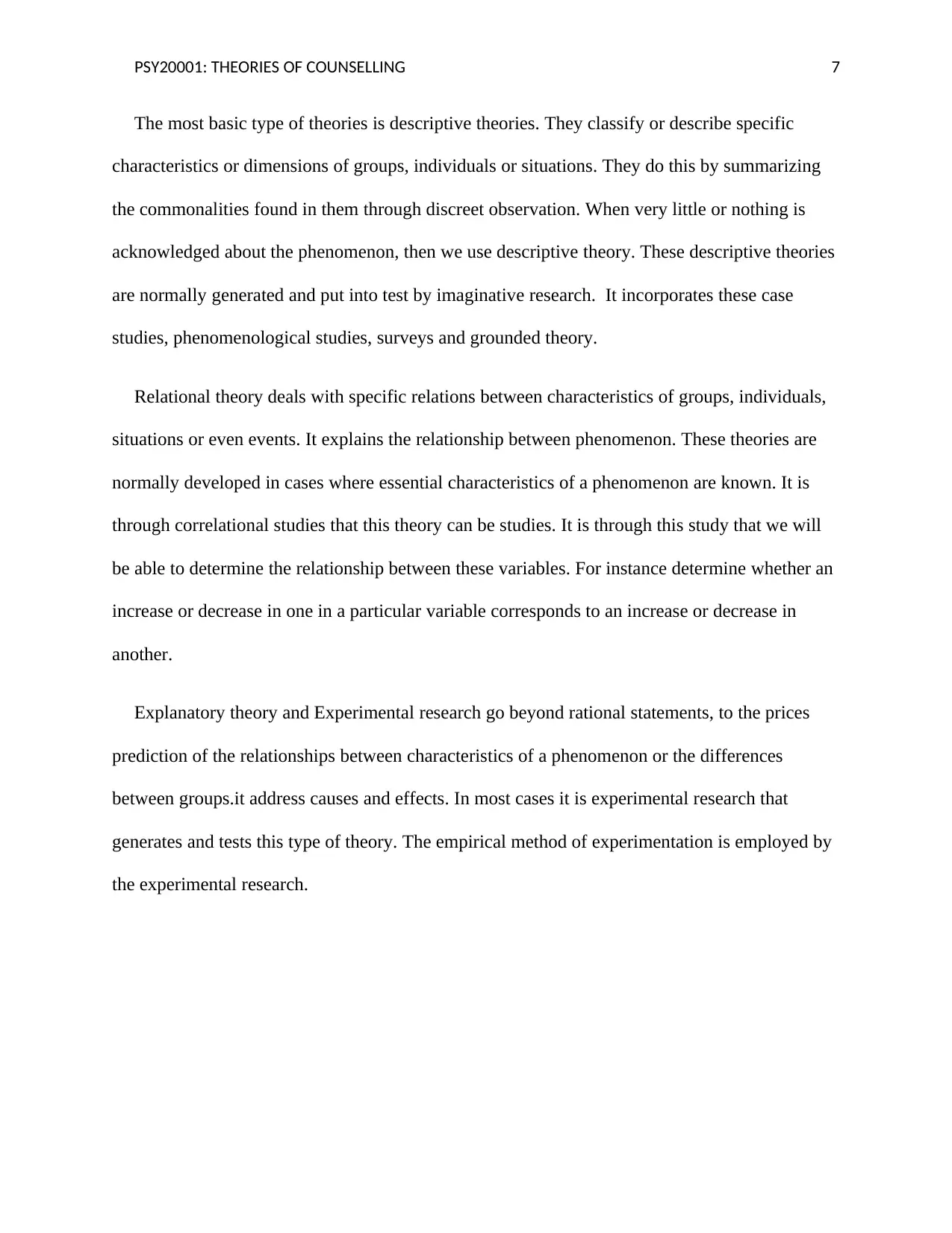
PSY20001: THEORIES OF COUNSELLING 7
The most basic type of theories is descriptive theories. They classify or describe specific
characteristics or dimensions of groups, individuals or situations. They do this by summarizing
the commonalities found in them through discreet observation. When very little or nothing is
acknowledged about the phenomenon, then we use descriptive theory. These descriptive theories
are normally generated and put into test by imaginative research. It incorporates these case
studies, phenomenological studies, surveys and grounded theory.
Relational theory deals with specific relations between characteristics of groups, individuals,
situations or even events. It explains the relationship between phenomenon. These theories are
normally developed in cases where essential characteristics of a phenomenon are known. It is
through correlational studies that this theory can be studies. It is through this study that we will
be able to determine the relationship between these variables. For instance determine whether an
increase or decrease in one in a particular variable corresponds to an increase or decrease in
another.
Explanatory theory and Experimental research go beyond rational statements, to the prices
prediction of the relationships between characteristics of a phenomenon or the differences
between groups.it address causes and effects. In most cases it is experimental research that
generates and tests this type of theory. The empirical method of experimentation is employed by
the experimental research.
The most basic type of theories is descriptive theories. They classify or describe specific
characteristics or dimensions of groups, individuals or situations. They do this by summarizing
the commonalities found in them through discreet observation. When very little or nothing is
acknowledged about the phenomenon, then we use descriptive theory. These descriptive theories
are normally generated and put into test by imaginative research. It incorporates these case
studies, phenomenological studies, surveys and grounded theory.
Relational theory deals with specific relations between characteristics of groups, individuals,
situations or even events. It explains the relationship between phenomenon. These theories are
normally developed in cases where essential characteristics of a phenomenon are known. It is
through correlational studies that this theory can be studies. It is through this study that we will
be able to determine the relationship between these variables. For instance determine whether an
increase or decrease in one in a particular variable corresponds to an increase or decrease in
another.
Explanatory theory and Experimental research go beyond rational statements, to the prices
prediction of the relationships between characteristics of a phenomenon or the differences
between groups.it address causes and effects. In most cases it is experimental research that
generates and tests this type of theory. The empirical method of experimentation is employed by
the experimental research.
Paraphrase This Document
Need a fresh take? Get an instant paraphrase of this document with our AI Paraphraser
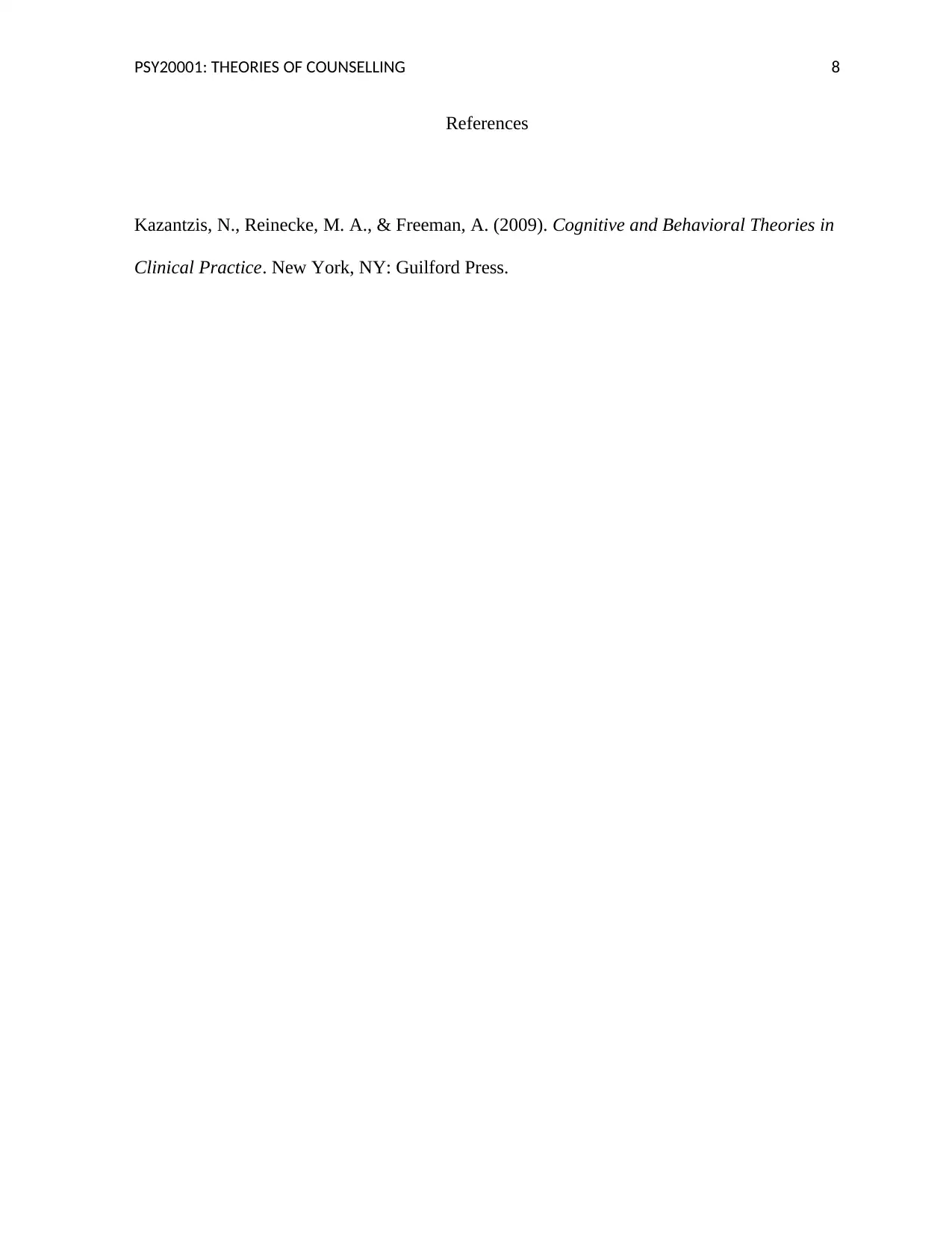
PSY20001: THEORIES OF COUNSELLING 8
References
Kazantzis, N., Reinecke, M. A., & Freeman, A. (2009). Cognitive and Behavioral Theories in
Clinical Practice. New York, NY: Guilford Press.
References
Kazantzis, N., Reinecke, M. A., & Freeman, A. (2009). Cognitive and Behavioral Theories in
Clinical Practice. New York, NY: Guilford Press.
1 out of 8
Your All-in-One AI-Powered Toolkit for Academic Success.
+13062052269
info@desklib.com
Available 24*7 on WhatsApp / Email
![[object Object]](/_next/static/media/star-bottom.7253800d.svg)
Unlock your academic potential
Copyright © 2020–2026 A2Z Services. All Rights Reserved. Developed and managed by ZUCOL.

